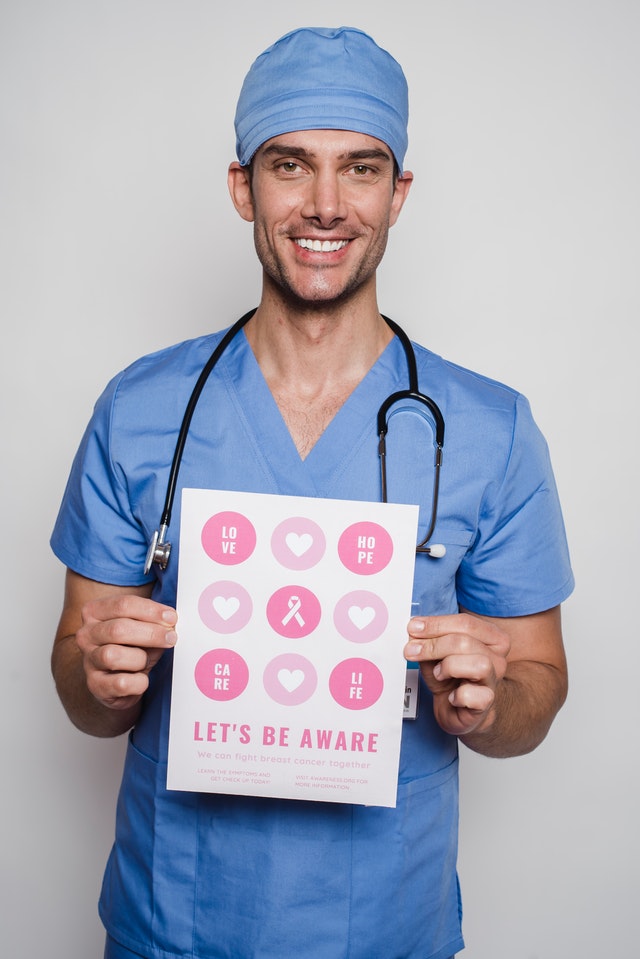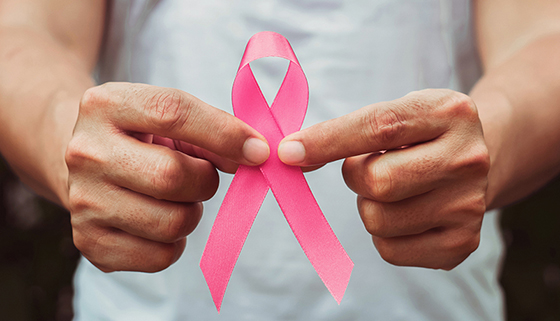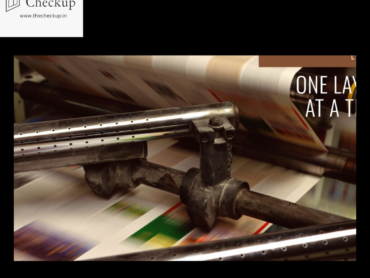A Tinge of Blue in The Ribbon of Pink
Although seemingly less common, men can fall prey to breast cancer as well. Talked about in a hush-hush manner, this diagnosis brings with it the burden of not only battling cancer but the daunting fear of stigma too. And it is this erroneous deep-rooted notion of society that waters this fear.
Coming to figures, less than 1% of all breast cancers occur in men. In 2021, about 2650 men were diagnosed with the disease, and about 530 men lost their lives to breast cancer. For men, the lifetime risk of being diagnosed with breast cancer is about 1 in 833. Nevertheless, for that 1 in 833, it is a diagnosis that will change his life. Considering the non-existent screening methods for breast cancer in men, with a pinch of lack of awareness and aberrant flaws in society’s opinion on men getting the disease, breast cancer in men is often detected late when cancer has already spread to other parts. Even if the person notices something unusual, he often brushes it off as something that will pass on its own.
For men, the lifetime risk of being diagnosed with breast cancer is about 1 in 833. Nevertheless, for that 1 in 833, it is a diagnosis that will change his life.
Men Have Breasts Too!
It is a myth that men cannot develop breast cancer because they don’t have developed breasts. Myth buster- both men and women, have some amount of breast tissue. The only difference is that after puberty, in girls and women, the myriad of hormones stimulate the breast tissue to grow into full breasts, and in men, they remain undeveloped.
What Affects the Early detection of Breast Cancer in Men?
What can be done about it?

Image Source: Photo by Klaus Nielsen from Pexels
- Breast size: A two-edged sword
Because men have little breast tissue, it can be easier for them and healthcare professionals to feel a mass. But, having little breast tissue also means it is easier for cancer to spread to the nipples, the skin covering the breast and the muscles underneath. Cancer has spread to nearby tissues and lymph nodes by the time the mass is felt, changing the prognosis crucially.
- Lack of awareness
” It begins as a lump.
Let us wait. Perhaps it is an infection? Maybe it will go away on its own. ”
It stays. It grows. It spreads.
Cancer has already hijacked other territories by the time the man decides to give it the attention it direly needs.
Many men delay getting a lump checked because of embarrassment and the unfateful attack at their masculinity by our functionally illiterate “society”.
- Men at high risk
For men at high risk because of a strong familial predisposition (breast cancer and/or BRCA mutation found by genetic testing), regular breast exams might be helpful to detect a lump earlier.
However, at present, no strategies revolve around the screening of men for breast cancer, and ultrasound and mammography are done only when a lump is found.
Stories of Survivors from Around the Globe
Sanjay Goel
Interviewing for Hindustan Times, Sanjay Goel narrates his battle with breast cancer; a diagnosis that spun his whole world upside down.
“I always had warning signs coming- at 24; I noticed a fluid discharge from my right breast, and by age 30, there was a lump, however only when bleeding happened I decided to consult a doctor”, says Goel. Goel’s doctor also failed to pick up the warning signs and started him on an antibiotic course, which temporarily helped, but these signs only heralded what was to come. Goel then consulted a different doctor when he also developed pain in his breast. An FNAC (Fine Needle Aspiration Cytology) confirmed the feared diagnosis, following which he underwent surgery, chemotherapy and radiotherapy.
Rick Baca (The Male Breast Cancer Coalition)
With an erratic work schedule, Rick Baca never planned to get the lump in his left chest, which he had felt some days prior, examined, thinking it to be a simple cyst. But as luck has it, not only did he get it diligently checked, but he got the most dreaded and unexpected six-letter diagnosis anyone can think of. One month later, he had a radical mastectomy of his left breast and about 21 lymph nodes removed, followed by a six-month course of chemotherapy. His journey did not stop here, which was followed by five weeks of radiation. But Rick did not give up and overcame the disease. He took the bull by its horns. The most challenging and unspoken part of the journey, he says, is to wait and see if cancer returns. At first, he used to feel embarrassed to be shirtless, uncomfortable at the stares he got for his scar. Now when he looks in the mirror, he sees opportunity- the opportunity to make a difference in other people’s lives and inspire others as well.
But Rick did not give up and overcame the disease. He took the bull by its horns.
To conclude, we, as a society, need to abandon the irrational views bequeathed on us and hold hands with our very own afflicted, who need our support to defeat cancer, emotionally as well as physically.
References:
- https://www.breastcancer.org/symptoms/types/male_bc
- https://malebreastcancercoalition.org/Survivor%20Stories/rick-baca/
- https://www.hindustantimes.com/health/men-too-can-have-breast-cancer-hear-it-from-a-survivor/story-llBTT6cQa6yC06C6DLdlRJ.html
- https://www.cancer.org/cancer/breast-cancer-in-men/detection-diagnosis-staging/detection.html










Comments